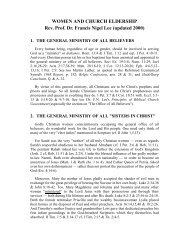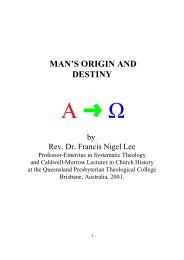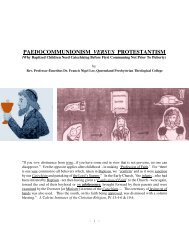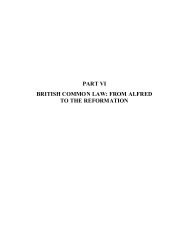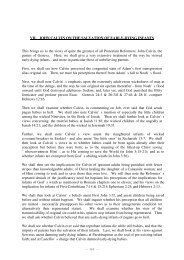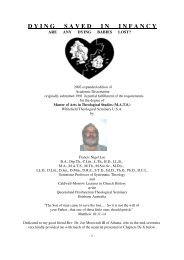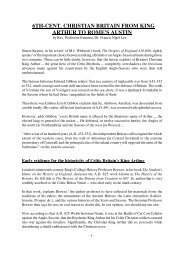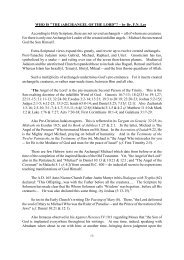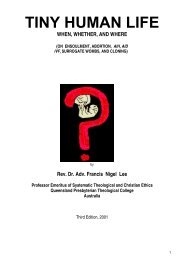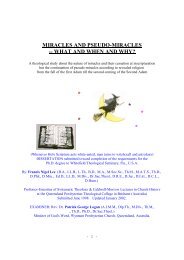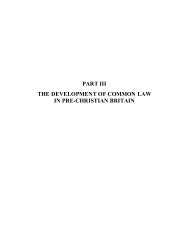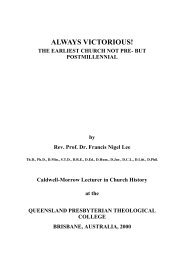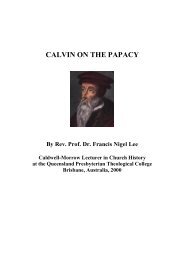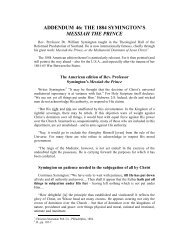THE CHRISTIAN AFRIKANERS - The Works of F. N. Lee
THE CHRISTIAN AFRIKANERS - The Works of F. N. Lee
THE CHRISTIAN AFRIKANERS - The Works of F. N. Lee
You also want an ePaper? Increase the reach of your titles
YUMPU automatically turns print PDFs into web optimized ePapers that Google loves.
Three: Unannihilated: the Resurrection <strong>of</strong> the AfrikanerAfter the "Calvary" <strong>of</strong> the Afrikaner's defeat at the end <strong>of</strong> the South African War, there was a lull.<strong>The</strong>reafter, that was followed by the "Resurrection" <strong>of</strong> Christian Afrikanerdom as a united nation.Here I wish to outline the eschatology <strong>of</strong> victory among the Afrikaners in the twentieth century.First, I shall give a general "bird's eye" view.In the last lecture we arrived at the debacle and the defeat <strong>of</strong> the Afrikaner during the Anglo BoerWar -- the Second South African War between the Afrikaner and the British Empire. It ended in1902, after three years <strong>of</strong> bitter fighting, in the defeat <strong>of</strong> the small number <strong>of</strong> Afrikaner farmersoutnumbered 25 to 1 on the field. It resulted in the annexation <strong>of</strong> the Old South African Republicand the Orange Free State Republic by Britain, and their incorporation into the BritishCommonwealth.<strong>The</strong> next ten years in South Africa was a decade <strong>of</strong> great difficulty. Many <strong>of</strong> the Afrikaners werevery depressed -- both economically and spiritually. Psychologically, they then felt the waySoutherners felt in the U.S. in the decade after their defeat during the American War Between theStates.Today, there are monuments that have been erected -- commemorating that period <strong>of</strong> time. In point<strong>of</strong> fact, though, the Afrikaner became very impoverished. He was disappropriated, as a result <strong>of</strong> theloss <strong>of</strong> the war. To a large extent, he was economically ruined. In many cases, his women andchildren had died in the British concentration camps. Farms had been burned down, and cropsdestroyed. <strong>The</strong> catastrophe was awful, and horrible to contemplate.Yet, even during those ten years, life had to go on. A very significant development was theestablishment <strong>of</strong> the so-called "Christian National" Schools. <strong>The</strong>se were privately owned, andgenerally started by the South African Reformed Churches -- meeting in facilities owned andfinanced by the Church. <strong>The</strong> Church too, <strong>of</strong> course, was struggling financially at that time. Itoperated independently <strong>of</strong> the Public School System, which had now fallen into the hands <strong>of</strong> theBritish conqueror.<strong>The</strong> Public Schools had now become a tool for de-calvinisation, at least for a long while. <strong>The</strong>y hadalso become a tool for anglicisation -- for turning the Afrikaner nation into an English-speakingnation and an integral part <strong>of</strong> the British Empire. So the emergence <strong>of</strong> these Christian NationalSchools during the decade 1900 to 1910 is a very important factor.By 1910, the forces <strong>of</strong> union in promoting the idea <strong>of</strong> a British commonwealth in South Africa, andespecially in the two conquered South African Republics, were strong enough to demand theAfrikaner's allegiance to the British Commonwealth. <strong>The</strong>re were those who resisted, but they werein a minority even amongst the Afrikaners. And yet the "Christian National" Schools, rising out <strong>of</strong>the ashes <strong>of</strong> military defeat, had during that ten-year framework nevertheless become strongenough and produced enough graduates to <strong>of</strong>fer a further stout resistance to the process <strong>of</strong>anglicisation <strong>of</strong> the Afrikaner.Even in 1910, those militant Afrikaners were still in the minority among their own nation.Nevertheless, they had now become strong enough to demand at least equality for the Afrikanerlanguage -- alongside <strong>of</strong> English -- in the new South Africa that was emerging.In 1910, a National Convention was held in South Africa. <strong>The</strong>re, political representatives <strong>of</strong> the



